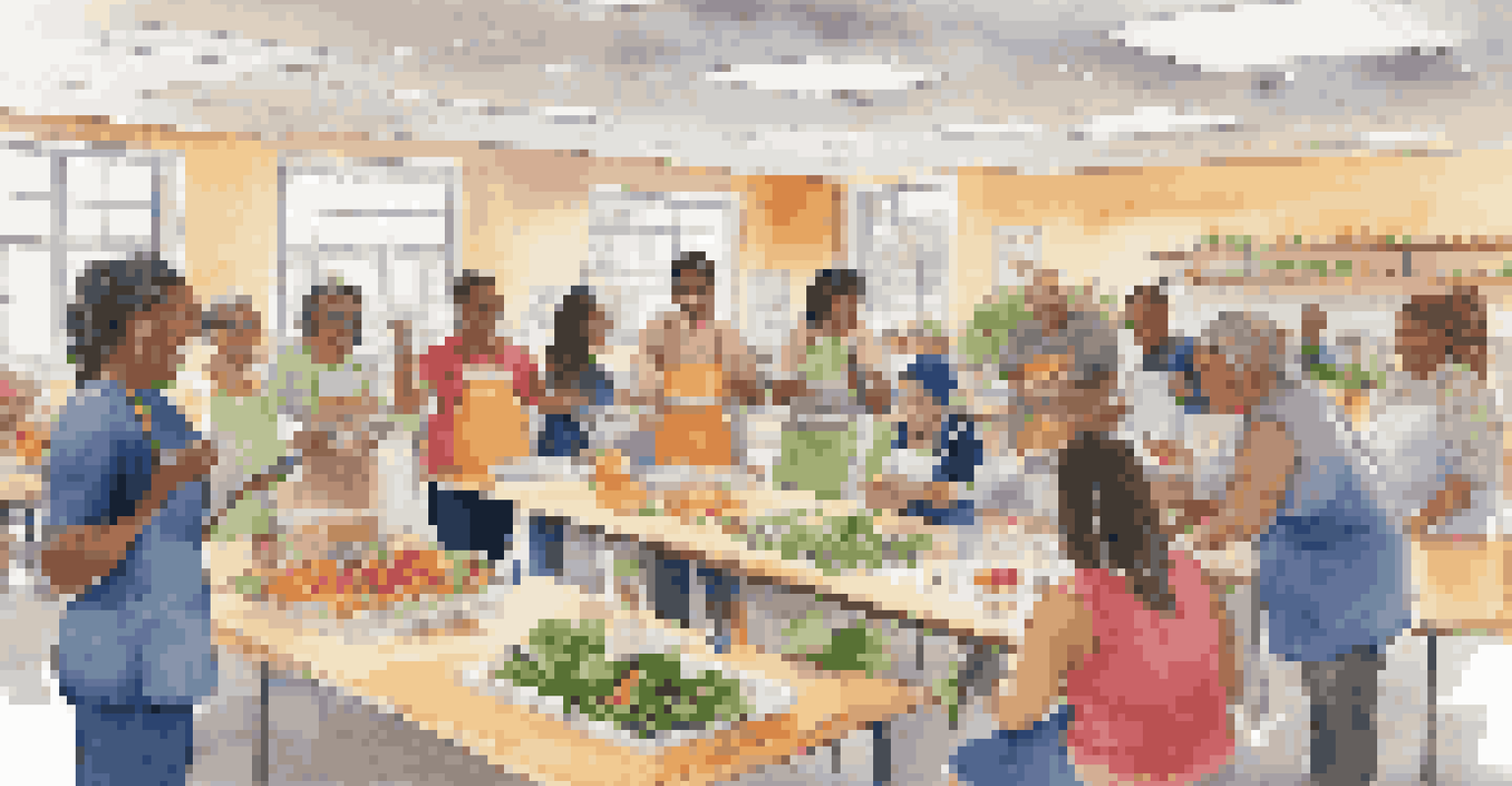The Connection Between Food Security and Community Health

Understanding Food Security: What Does It Mean?
Food security refers to having reliable access to a sufficient quantity of affordable, nutritious food. When people are food secure, they can maintain a healthy diet and overall well-being. Conversely, food insecurity can lead to malnutrition and various health issues, creating a cycle of disadvantage in communities.
Food security is a condition related to the supply of food, and individuals' access to it.
Imagine a family struggling to put meals on the table, often opting for cheaper, processed foods that may lack essential nutrients. This scenario is common in food-insecure households, where budget constraints limit healthier choices. Understanding food security is crucial to addressing these challenges and promoting community health.
Food security is not just about availability; it also encompasses the quality of food and the socioeconomic conditions that affect access. By improving food security, we can significantly enhance the health outcomes of individuals and communities.
The Impact of Food Insecurity on Health Outcomes
Food insecurity is linked to a plethora of health problems, including obesity, diabetes, and cardiovascular diseases. When individuals lack access to nutritious foods, they often resort to high-calorie, low-nutrient options, which can lead to weight gain and related health issues. This paradox highlights how food insecurity can contribute to poor health, even in the presence of excess food.

For instance, a study showed that low-income families are more likely to experience diet-related diseases due to limited access to healthy food choices. The stress of food insecurity can also exacerbate mental health issues like anxiety and depression, creating a vicious cycle. Addressing these health disparities is essential for fostering a healthier community.
Food Security Affects Community Health
Ensuring access to affordable, nutritious food is vital for improving health outcomes and reducing diet-related diseases in communities.
Improving community health starts with addressing food insecurity. By ensuring that all community members have access to healthy food options, we can reduce the prevalence of diet-related diseases and improve overall well-being.
The Role of Nutrition Education in Food Security
Nutrition education plays a pivotal role in enhancing food security within communities. When individuals understand the importance of balanced diets and how to prepare nutritious meals, they are better equipped to make healthier choices. This education can empower people to utilize the resources available to them effectively.
The greatest weapon against hunger is not a sack of rice. It is a seat at the table.
Consider a workshop where families learn to cook healthy meals on a budget. Participants not only gain cooking skills but also discover the value of nutritious ingredients, fostering a sense of community and shared knowledge. Such programs can bridge the gap between food availability and actual food consumption.
By investing in nutrition education, communities can improve food security and health outcomes. This proactive approach encourages long-term changes in dietary habits, leading to healthier and more informed populations.
Community Gardens: A Solution for Food Insecurity
Community gardens have emerged as a powerful tool in addressing food security and promoting health. These shared spaces allow individuals to grow their own fruits and vegetables, providing fresh produce while fostering community engagement. Gardening also teaches valuable skills and encourages physical activity.
Imagine a neighborhood where families come together to cultivate a garden, sharing not just the harvest but also stories and experiences. This sense of belonging can significantly improve mental well-being and strengthen community ties, creating a supportive environment for all.
Nutrition Education Empowers Choices
Providing nutrition education enables individuals to make healthier food choices and utilize available resources effectively.
Moreover, community gardens can reduce reliance on expensive grocery stores, making healthy food more accessible. They serve as a vital resource for low-income families, contributing to better nutrition and overall health in the community.
Policy Initiatives to Enhance Food Security
Government policies play a crucial role in improving food security and health outcomes. Initiatives like food assistance programs, subsidies for local farmers, and regulations promoting food access in underserved areas can make a significant difference. These policies create an environment where healthy food is available and affordable for everyone.
By supporting local agriculture and reducing food deserts, policymakers can ensure that all communities have access to nutritious food options. For example, programs that incentivize grocery stores to open in low-income neighborhoods can help bridge the gap between food availability and access.
Effective policies not only improve food security but also enhance community health. When individuals can access healthy foods easily, we see a decline in diet-related diseases and an overall improvement in public health.
The Connection Between Food Security and Mental Health
Food security is intricately linked to mental health, with food insecurity often leading to increased stress, anxiety, and depression. The constant worry about where the next meal will come from can take a significant toll on an individual's mental well-being. This connection underscores the importance of addressing food security as part of a holistic approach to health.
Imagine a single parent juggling multiple jobs and struggling to provide nutritious meals for their children. The stress of food insecurity can lead to feelings of hopelessness and despair, impacting their mental health and overall family dynamics. Addressing food security can alleviate some of this burden, leading to improved mental health outcomes.
Community Gardens Foster Resilience
Community gardens not only provide fresh produce but also strengthen social ties and enhance mental well-being among residents.
By recognizing the link between food security and mental health, we can develop targeted interventions that support both aspects. This approach can foster resilience in communities and promote healthier, happier lives.
Building Resilient Communities Through Food Security
Building resilient communities starts with addressing food security. When people have reliable access to nutritious food, they are better equipped to face challenges and thrive. Resilient communities are those that can adapt and recover from hardships, and food security is a fundamental component of that resilience.
Consider communities that come together to create local food systems, promoting sustainable practices and supporting local farmers. Such initiatives not only enhance food security but also strengthen social ties and boost the local economy. This collective effort fosters a sense of pride and ownership among community members.

By prioritizing food security, we can create strong, resilient communities that prioritize health and well-being. This investment in collective health not only benefits individuals but also contributes to the overall vitality of society.